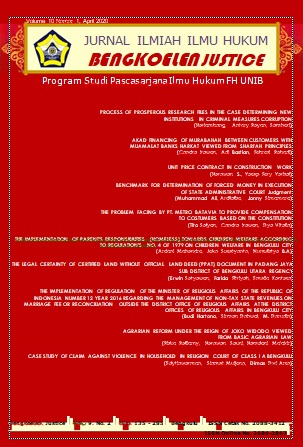Main Article Content
Abstract
This study aims to determine what factors cause one of the parties to commit domestic violence and how is the judge's consideration in completing the case for divorce due to domestic violence in the Class I A Bengkulu Religious Court. In this study the authors use a normative juridical approach, also called research on doctrinal law that is the law conceptualized as what is written in the legislation or law conceptualized as a rule or norm which is a benchmark of human behavior that is considered appropriate. In this study, what was sought was the decision of the Bengkulu Class Religion Court in deciding the case for divorce due to domestic violence. In this study the authors used a type of descriptive research, which is to provide as much detailed data as possible about human conditions or other symptoms. This descriptive method is intended to obtain a good, clear picture and can provide as much detailed data as possible about the object under study. In this case to describe the divorce due to domestic violence. The results of this study are expected to be used as a reference in conducting legal counseling in the city of Bengkulu to increase community legal awareness that domestic violence is contrary to applicable laws and regulations and as a reference material for the enrichment of civil law teaching materials in general and marriage law in general. especially.
Keywords
Article Details
References
- Amirudin Zainal Asikin, 1995. Pengantar Metode Penelitian Hukum, Jakarta: PT Rajagrapindo.
- Ahrum Hoerudin, 1999. Pengadilan Agama (Bahasan Tentang Pengertian, PengajuanPerkara, dan Kewenangan Pengadilan Agama Setelah Berlakunya Undang-Undang Nomor 7Tahun 1989 Tentang Peradilan Agama), Bandung: PT. Aditya Bakti.
- Cholid Narbuko, Abu Achmadi,1997. Metode Penelitian, Jakarta : Bumi Pustaka.
- Djamal Latief, H. M SH , 1982. Aneka Hukum Peceraian Di Indonesia, Jakarta : Ghalia Indonesia.
- Farha Ciciek. (2003). Jangan Ada Lagi Kekerasan Dalam Rumah Tangga. Jakarta: Gramedia Pustaka Utama.
- H. Zainuddin Ali, 2009. Hukum Perdata Islam di Indonesia, Jakarta: Sinar Grafika.
- Hilman Hadikusuma, 1991. Pembuatan Kertas Kerja Skripsi Hukum, Bandung : Mandar Maji.
- Noelle Nelson, 2006.”Bagaimana Mengenali dan Merspon Sejak Dini Gejala Kekerasan Dalam Rumah Tangga, : Gramedia.
- Simorangkir dkk, 2008. Kamus Hukum, Jakarta: Sinar Grafika, Cetakan Ke-12.
- Sudarsono, ....... Kamus Hukum, hal. 482
- Soebekti, 1987. Pokok-Pokok Hukum Perdata,. Cet XX1: PT Inter Massa.
- Soerjono Soekanto, 1998. Pengantar Penelitian Hukum, Jakarta : UI Pres.
- S.Nasution, 2001. Metode Resech, Jakarta : Bumi Aksara.
- Tim Redaksi FOKUSMEDIA, 2005. Himpunan Peraturan Perundang-Undangan Tentang Kompilasi Hukum Islam, Bandung: Fokusmedia.
- Regulations :
- Kompilasi Hukum Islam, Bab 1. Hukum Perkawinan.
- Undang-Undang Nomor 1 Tahun 1974 Tentang Perkawinan
- Undang-Undang Nomor 7 Tahun 1989 Tentang Peradilan Agama diperbaharui oleh UU No. 50 Tahun 2009 Tentang Peradilan Agama.
- Undang-Undang Nomor 23 Tahun 2004 Tentang Penghapusan Kekerasan Dalam Rumah.
- Peraturan Mahmakamah Agung Nomor 1 Tahun 2016 tentang Prosedur Mediasi di Pengadilan
References
Amirudin Zainal Asikin, 1995. Pengantar Metode Penelitian Hukum, Jakarta: PT Rajagrapindo.
Ahrum Hoerudin, 1999. Pengadilan Agama (Bahasan Tentang Pengertian, PengajuanPerkara, dan Kewenangan Pengadilan Agama Setelah Berlakunya Undang-Undang Nomor 7Tahun 1989 Tentang Peradilan Agama), Bandung: PT. Aditya Bakti.
Cholid Narbuko, Abu Achmadi,1997. Metode Penelitian, Jakarta : Bumi Pustaka.
Djamal Latief, H. M SH , 1982. Aneka Hukum Peceraian Di Indonesia, Jakarta : Ghalia Indonesia.
Farha Ciciek. (2003). Jangan Ada Lagi Kekerasan Dalam Rumah Tangga. Jakarta: Gramedia Pustaka Utama.
H. Zainuddin Ali, 2009. Hukum Perdata Islam di Indonesia, Jakarta: Sinar Grafika.
Hilman Hadikusuma, 1991. Pembuatan Kertas Kerja Skripsi Hukum, Bandung : Mandar Maji.
Noelle Nelson, 2006.”Bagaimana Mengenali dan Merspon Sejak Dini Gejala Kekerasan Dalam Rumah Tangga, : Gramedia.
Simorangkir dkk, 2008. Kamus Hukum, Jakarta: Sinar Grafika, Cetakan Ke-12.
Sudarsono, ....... Kamus Hukum, hal. 482
Soebekti, 1987. Pokok-Pokok Hukum Perdata,. Cet XX1: PT Inter Massa.
Soerjono Soekanto, 1998. Pengantar Penelitian Hukum, Jakarta : UI Pres.
S.Nasution, 2001. Metode Resech, Jakarta : Bumi Aksara.
Tim Redaksi FOKUSMEDIA, 2005. Himpunan Peraturan Perundang-Undangan Tentang Kompilasi Hukum Islam, Bandung: Fokusmedia.
Regulations :
Kompilasi Hukum Islam, Bab 1. Hukum Perkawinan.
Undang-Undang Nomor 1 Tahun 1974 Tentang Perkawinan
Undang-Undang Nomor 7 Tahun 1989 Tentang Peradilan Agama diperbaharui oleh UU No. 50 Tahun 2009 Tentang Peradilan Agama.
Undang-Undang Nomor 23 Tahun 2004 Tentang Penghapusan Kekerasan Dalam Rumah.
Peraturan Mahmakamah Agung Nomor 1 Tahun 2016 tentang Prosedur Mediasi di Pengadilan

